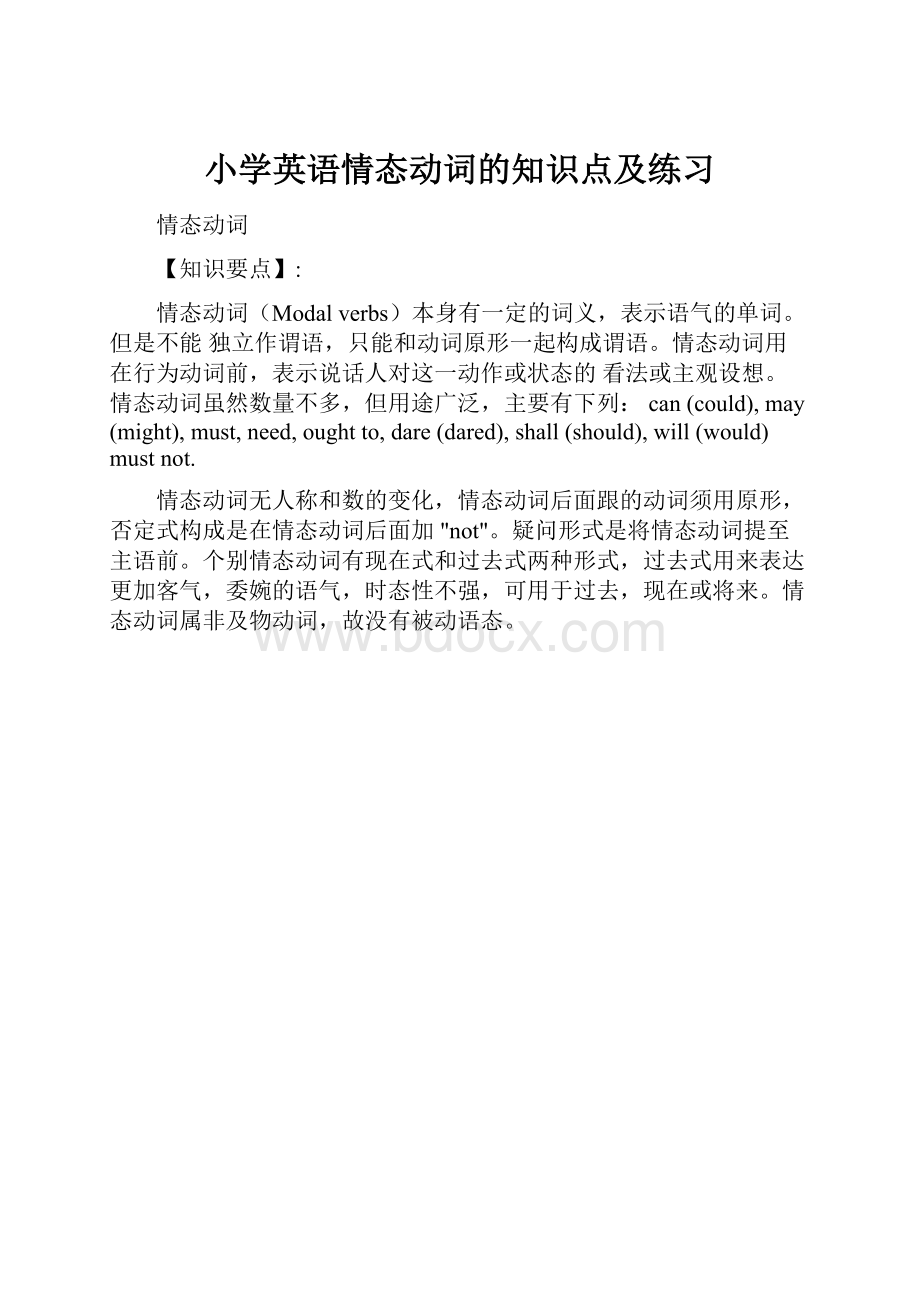小学英语情态动词的知识点及练习.docx
《小学英语情态动词的知识点及练习.docx》由会员分享,可在线阅读,更多相关《小学英语情态动词的知识点及练习.docx(15页珍藏版)》请在冰豆网上搜索。

小学英语情态动词的知识点及练习
情态动词
【知识要点】:
情态动词(Modalverbs)本身有一定的词义,表示语气的单词。
但是不能独立作谓语,只能和动词原形一起构成谓语。
情态动词用在行为动词前,表示说话人对这一动作或状态的看法或主观设想。
情态动词虽然数量不多,但用途广泛,主要有下列:
can(could),may(might),must,need,oughtto,dare(dared),shall(should),will(would)mustnot.
情态动词无人称和数的变化,情态动词后面跟的动词须用原形,否定式构成是在情态动词后面加"not"。
疑问形式是将情态动词提至主语前。
个别情态动词有现在式和过去式两种形式,过去式用来表达更加客气,委婉的语气,时态性不强,可用于过去,现在或将来。
情态动词属非及物动词,故没有被动语态。
【典型例题】:
【专题一】:
can和could的用法
【例1】Canyouliftthisheavybox?
(体力)
【解析】表示能力(体力、知识、技能)
【练习】
1.Maryspeakthreelanguages.(知识)
2.youskate?
(技能)
此时可用beableto代替。
Can只有一般现在时和一般过去式;而beableto则有更多的时态。
I’llnotbeabletocomethisafternoon.
当表示“经过努力才得以做成功某事”时应用beableto,不能用Can。
【例2】
-----CanIgonow?
-----Yes,youcan./No,youcan’t.
【解析】表示请求和允许。
此时可与may互换。
在疑问句中还可用could,might代替,不是过去式,只是语气更委婉,不能用于肯定句和答语中。
【练习】
----Icometoseeyoutomorrow?
----Yes,you.
----No,you/I’mafraidnot.
【例3】Canthisbetrue?
【解析】表示推测(惊讶、怀疑、不相信的态度),用于疑问句、否定句和感叹句中。
【练习】
Thisbedonebyhim.
Howthisbetrue?
【专题二】may和might的用法:
【例1】----Might/MayIsmokeinthisroom?
----No,youmustn’t.
【解析】表示请求和允许。
might比may语气更委婉,而不是过去式。
否定回答时可用can’t或mustn’t,表示“不可以,禁止”。
用MayI...?
征徇对方许可时比较正式和客气,而用CanI...?
在口语中更常见。
【练习】
----Itakethisbookoutoftheroom?
----Yes,you.No,you
【例2】Mayyousucceed!
【解析】用于祈使句,表示祝愿。
【例3】Hemay/mightbeverybusynow.
【解析】表示推测、可能性(不用于疑问句)。
might不是过去式,它所表示的可能性比may小。
【练习】
1.Yourmothernotknowthetruth.
2.Heverybusynow.他现在可能很忙。
【专题三】must和haveto的用法:
【例1】Themanbeourteacher。
那个人一定是我们的老师。
【例2】Istudyhardbecauseofmydream.为了我的梦想我必须努力学习。
【例3】1.Youcomeintime.你必须准时过来
【解析】:
must表示必须、必要。
表示主观对事物的推测时,意为想必、一定,只用于肯定句中;表推测时,情态动词与动词原形(常为be动词)连用。
而haveto强调客观需要。
【练习】:
1.Herplayisboring,Igonow.
2.Yourmotherbewaitingforyounow.
3.Igohome,becausemyfatherisill.
【例4】---Mustwehandinourexercisebookstoday?
---Yes,you
---No,you
【解析】:
在回答由must引出的问句时,如果是否定的,不能用mustn’t,而用needn’t,don’thaveto.must是说话人的主观看法,而haveto则强调客观需要。
【练习】:
---Musthegotoschoolnow?
---Yes,he
---No,he.
【专题四】should及其否定式用法
【例1】:
Ishouldhelpherbecausesheisintrouble.
【解析】:
should表示应该、劝告、建议和命令。
【练习】:
1.Yougotoclassrightaway.
2.Iopenthewindow?
【专题四】need的用法
【例1】:
Youneedn’tcomesoearly.
【解析】need作情态动词用时,常用于疑问句、否定句。
在肯定句中一般用must,haveto,oughtto,should代替
【练习】
----NeedIfinishtheworktoday?
----Yes,you/No,you
【专题五】should的用法
【例1】Ishouldhelpherbecausesheisintrouble.
【解析】should表示应该
【练习】
Youtakecareofthebaby.
【例2】Youshouldgotoclassrightaway.
【解析】表示劝告、建议和命令。
在疑问句中常用should。
【练习】Iopenthewindow?
【专题六】will和would的用法
【例1】Iwilldoanythingforyou.
【解析】表示询问,请求,将要。
【练习】
1.youpassmethebook?
2.Shegotothelibrary.
【例2】wouldyoutellmethewaytotheschool?
【解析】表示过去的意愿或委婉提问
自我检测
(一)用适当的情态动词填空。
1.MustIborrowthebookwithmyIDcard?
No,you
2.Iuseyourcar?
Yes,you
3.Igohomenow?
No,youstayhereandwaitfortheteacher.
4.Mymotherisill.Istayathomeandlookafterher.
5.Isendanemailtomyfriend.
6.Youtakemoreexercise.
7.youtellmehowtogettothePark?
8.Wehelpeachother.
9.youliketogofishingwithme?
10.weplayfootballthisafternoon?
(二)按要求改写句子。
1.Icanrunfast.(否定句)
Ifast.
2.Youmustreturnthebooknow.(一般疑问句)
Ireturnthebooknow?
No,you.
3.Hecanplaybasketballwell.(一般疑问句)
Hebasketballwell?
4.Theymusttakethebooksoutoftheroom.(否定
句)
Theythebooksoutoftheroom.
5.Hewillgetupearly.(否定句)
Hegetupearly.
(三)选择题。
1.ItoldSallyhowtogethere,butperhapsI_______forher.
A.hadtowriteitoutB.musthavewrittenitout
C.shouldhavewrittenitouD.oughttowriteitout
2.—Therewerealreadyfivepeopleinthecarbuttheymanagedtotakemeaswell.
—It_______acomfortablejourney.
A.can’tbeB.shouldn’tbe
C.mustn’thavebeenD.couldn’thavebeen
3.It’snearlyseveno’clock.Jack_______behereatanymoment.
A.mustB.needC.shouldD.can
4.Johnny,you_______playwiththeknife,you_______hurtyourself.
A.won’t;can’tB.mustn’t;may
C.shouldn’t;mustD.can’t;shouldn’t
5.Thefirespreadthroughthehotelveryquicklybuteveryone_______getout.
A.hadtoB.wouldC.couldD.wasableto
6.—WhencanIcomeforthephotos?
Ineedthemtomorrowafternoon.
—They_______bereadyby12:
00.
A.canB.shouldC.mightD.need
7.—IstayedatahotelwhileinNewYork.
—Oh,didyou?
You_______withBarbara.
A.couldhavestayedB.couldstay
C.wouldstayD.musthavestayed
8.—AreyoucomingtoJeff’sparty?
—I’mnotsure.I_______gototheconcertinstead.
A.mustB.wouldC.shouldD.might
9.Iwasreallyanxiousaboutyou.You_______homewithoutaword.
A.mustn’tleaveB.shouldn’thaveleft
C.couldn’thaveleftD.needn’tleave
10.—IsJohncomingbytrain?
—Heshould,buthe_______not.Helikesdrivinghiscar.
A.mustB.canC.needD.may
11.Aleft-luggageofficeisaplacewherebags_______beleftforashorttime,especiallyatarailwaystation.
A.shouldB.canC.mustD.will
12.Iwonderhowhe_______thattotheteacher.
A.daretosayB.daresaying
C.notdaresayD.daredsay
13.Whenhewasthere,he_______gotothatcoffeeshopatthecornerafterworkeveryday.
A.wouldB.shouldC.hadbetterD.might
14.Ithasbeenannouncedthatcandidates_______remainintheirseatsuntilallthepapershavebeencollected.
A.canB.willC.mayD.shall
15.How_______yousaythatyoureallyunderstandthewholestoryifyouhavecoveredonlyapartofthearticle?
A.canB.mustC.needD.may
16.—Ihearyou’vegotasetofvaluableAustraliancoin._______Ihavealook?
—Yes,certainly.
A.DoB.MayC.ShallD.Should
●答案解析●
(1)、1.needn’t/don’thaveto2.Cancan3.Maymust4.haveto5.will6.should7.can/could8.must/should9.Would10.can
(二)1.Can’trun2.Mustneedn’t3.Canplay4.can’ttake5.wouldn’t
(三)1.C。
“oughtto/shouldhave+过去分词”表示后悔当初该做但却没做某事。
“…也许我本该把详细地址写给她的。
”
2.D。
“couldn’thave+过去分词”表示对过去情况的推测。
既然小汽车上“已有五人”,且是“设法”才把你带去的,如此拥挤,旅途当然“不可能”舒服。
3.C。
nearly暗示“时间不早了”,Jack“按理应当(should)随时(atanymoment)”都有可能到达这里。
must语气过强;can一般不用于肯定推测;need意义不通,也不用于肯定句。
4.B。
mustn’t(不许、千万不)表示禁止。
may表示可能性。
句意为“你千万不要玩刀子,可能会弄伤自己的”。
5.D。
表示过去具体某次“能够”做成某事只能用was/wereableto而不用could。
6.B。
should表示按理应当,大概。
can一般不用于肯定推测;用might语气太不肯定,顾客可能走掉。
7.A。
couldhavedone表示本可以做但却没有做的事。
句意为“你本来可以住在Barbara那儿的”;而musthavedone只表示有把握的肯定推测,这与前面具有疑问语气的Oh,didyou?
不符。
8.D。
语境明显提示“我可能(might)要去听音乐会”。
9.B。
表示轻微的责备,句意为“我真的好担心你啊。
你当时本不该不说一声就离开家的”。
10.D。
由“他自己喜欢开车”这一习惯推断,“他可能不会(maynot)坐火车来”。
cannot“不可能”,语气太肯定。
11.B。
can表示“可以”。
should(应该),must(必须),will(愿意)均不符合语境。
12.D。
dare作行为动词时,一般接todo,但疑问式或否定式中to可以省略,此句有疑问口气。
13.A。
would表示过去的习惯。
14.D。
在规章中告诫应考者,在收完所有试卷前“必须”留在教室里。
15.A。
can在疑问句中,表示疑惑、怀疑,根据情况可译作“能、可以”等。
16.B。
may表示请求对方允许,即:
“我可以做…吗?
”
赠送以下资料
英语万能作文(模板型)
Alongwiththeadvanceofthesocietymoreandmoreproblemsarebroughttoourattention,oneofwhichisthat....
随着社会的不断发展,出现了越来越多的问题,其中之一便是____________。
Astowhetheritisablessingoracurse,however,peopletakedifferentattitudes.
然而,对于此类问题,人们持不同的看法。
(Holddifferentattitudes持不同的看;Comeupwithdifferentattitudes有不同的看法)
Associetydevelops,peopleareattachingmuchimportanceto....
随着社会的发展,人们开始关注............
Peopleareattachingmoreandmoreimportancetotheinterviewduringjobhunting
求职的过程中,人们慢慢意识到面试的重要性。
Astowhetheritisworthwhile.....,thereisalong-runningcontroversialdebate.Itisquitenaturalthatpeoplefromdifferentbackgroundsmayhavedivergentattitudestowardsit.
关于是否值得___________的问题,一直以来争论不休。
当然,不同的人对此可能持不同的观点。
Intheprocessofmodernurbandevelopment,weoftenfindourselvesinadilemma.
在都市的发展中,我们往往会陷入困境。
Recentlythephenomenonhasarousedwideconcern,somepeopleareinalarmthat....
最近,这种现象引起了人们的广泛关注,有人开始担心______________。
Thehumanracehasenteredacompletelynewstageinitshistory,withtheincreasinglyrapideconomicglobalizationandurbanization,moreproblemsarebroughttoourattention.
人类进入了一个历史的崭新的阶段,经济全球化、都市化的速度不断加快,随之给我们带来了很多问题。
......playssuchanimportantrolethatitundeniablybecomesthebiggestconcernofthepresentworld,therecomesaquestion,isitablessingoracurse?
"
_______显得非常重要而成为当今世界所关注的最大的问题,这是无可厚非的。
不过,问题是:
"我们该如何抉择?
"
Nowweareenteringanewera,fullofopportunitiesandchallenges,
现在我们正在进入一个充满机会和挑战的新时代。
Peoplefromdifferentbackgroundswouldputdifferentinterpretationsonthesamecase.
不同行业的人对同一种问题的解释不尽相同。
Thecontroversialissueisoftenbroughtintopublicfocus.Peoplefromdifferentbackgroundsholddifferentattitudestowardstheissue.
这中极具争议性的话题往往很受社会的关注。
不同的人对此问题的看法也不尽相同。
Whenasked...,somepeoplethink.....whilesomeprefer...
说到______,有人认为________,而另一些人则认为__________。
Justasthesayinggoes:
"somanypeople,somanyminds".Itisquiteunderstandablethatviewsonthisissuevaryfrompersontoperson.
俗话说,""。
不同的人对此有不同的看法是可以理解的。
Tothisissue,differentpeoplecomeupwithvariousattitudes.
对于这个问题,不同的人持不同的观点。
Thereisagoodsideandabadsidetoeverything,itgoeswithoutsayingthat...
万事万物都有其两面性,所以,勿庸置疑,____________。
Whenitcomesto...,mostpeoplebelievethat...,butotherpeopleregard...as....
提到_________问题,很多人认为_________,不过,一些人则认为______是____.
Whenfacedwith....,quiteafewpeopleclaimthat....,butotherpeoplethinkas...
提到_________问题,仅少数人认为________,但另一些人则认为_________。
Thereisapubliccontroversynowadaysovertheissueof....Therewhocriticize...arguethat....,theybelievethat...,butpeoplewhofavor..,ontheotherhand,arguethat...